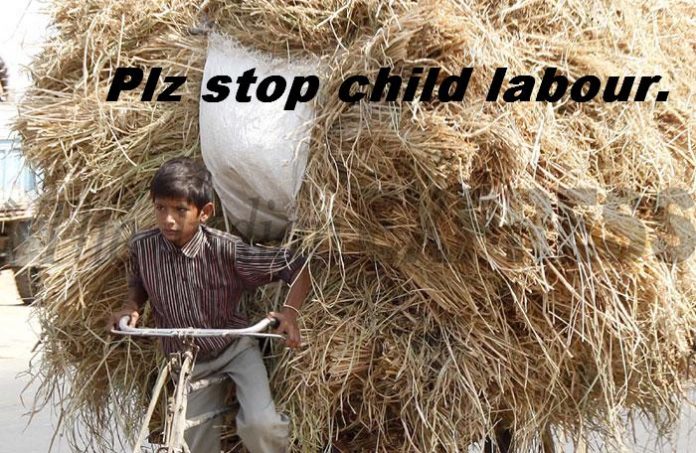This Article is written by Kishore Deshpande as part of his coursework.
The Ministry of Labor and Employment is responsible for all matters concerning Labor and it functions in the following areas:
- Labour policy and laws
- Safety, health and welfare of the Labor force
- Job and Social Security of the Labor force
- Laying down the policy pertaining to child labor
- Enforcement of Labor laws in companies
- Mediating in Industrial disputes via Central Government Industrial Tribunals or Labor Courts and National Industrial Tribunals
- Education for the Workforce
- Carrying out research programmes on Labor and Employment.
The Child Labor (Prohibition and Regulation) Act, 1986 and the Child Labor (Prohibition and Regulation) Amendment Act, 2016, is enacted to prohibit the employment of children in all occupations and to prohibit the engagement of adolescents in hazardous occupations and processes and the matters concerned therewith or incidental there to.
The Act seeks to protect the exploitation of Children in occupations which may prove to be detrimental to their health and well-being. The Act further goes to identify and isolate children and adolescents from adults as given below:
“child” is termed as a person who has not yet achieved the age of 14 years;
“adolescent” is termed as a person who has achieved the age of 14 years but is still short of achieving the age of 18 years.’
The Child Labour (Prohibition and Regulation) ACT, 1986
Objective
To prohibit the employment of children in certain occupations and to regulate the conditions of work of children engaged in certain other employment.
Definition of Child
Child means a person who has not yet achieved the age of fourteen years.
Applicability
It extends to the whole of India.
Prohibition of children in certain occupations and processes
No child shall be engaged or allowed to work in any of the occupations as set forth in part ‘A’ of the Schedule or in any of the process or any workshop where it is set forth in part ‘B’ of the Schedule to the Act.
- Transportation of passengers, goods; or mails by railway
- Cinder picking, clearing of an ash pit or building operation in the railway premise.
- Work in a catering establishment at a railway station, involving the movement of the vendor or any other employee of the establishment from one platform to another or into or out of a moving train.
- Work relating to the railway station construction or with any other work where such work is done in close proximity to railway lines or between the railway lines.
- Any work carried out within the port authority limits of any port.
- Dhabas (roadside eateries), restaurants, hotels, motels, tea shops, resorts, spas or other recreational centres.
Hours And Period of Work
- Under Section 7, no child shall be required or allowed to work in any establishment in excess of the number of hours prescribed. As per Rule -3, in Kerala, the working hours are limited to 4½ hours per day.
- The duration of work every day shall not exceed 3 hours and no child shall work for more than 3 hours before he has had an interval for rest for at least 1 hour. No child shall be allowed or required to work between 7 PM and 8 AM
- As per Section 7, no child shall be required or allowed to work overtime.
Weekly Holiday
- Section 8 stipulates that every child shall be allowed a holiday every week of 1 whole day.
Notice To Inspector
- Section 8 read with Rule 4 – Every employer shall send a written notice within 30 days in the prescribed “Form-A” to the inspector in whose local limits the establishment is situated.
Disputes as to Age
- Section 10 read along with Rule 16 states that If any dispute arises between an inspector and an employer as to the age of any child, in the absence of a certificate in Form-C as to the age of such child granted by the prescribed medical authority. He may then be referred by the inspector for the decision to the prescribed medical authority. (A Government Medical Officer not below the rank of an Assistant Surgeon of a District or officers having an equivalent rank in ESI Dispensaries or hospitals.)
Registers
- Every occupier of an establishment shall maintain a register in respect of children employed or permitted to work at the establishment in Form-B. (Sect. II read with Rule-15)
Display of Notice
- Every occupier shall display in the establishment the abstract of section-3 and 14 in Form-D of the Act (Section 12 read with Rule -17)
Penalties
- Violations under Section-3 shall be punishable with imprisonment which shall not be lower than 3 months and which may extend to 1 year or with fine which shall not be less than Rs.10,000/- but which may extend to Rs. 20,000/- or with both.
- A repeated offence under Section 3 shall be punishable with imprisonment for a term which shall not be less than 6 months but which may be extended by 2 years.
- Any other violations under the Act shall be punishable with simple imprisonment, which may extend to one month or with fine, which may extend to ten thousand rupees or with both.

Who Can File Prosecutions
- Any person
- Police Officer
- Inspector appointed under the Act
Section 16 of the Act stipulates that no court inferior to that of a Metropolitan Magistrate or that of a First Class Magistrate shall try any offences.
An aggrieved person can make a complaint as given below
- Contact the nearest Local Police Station and register his complaint.
- Contact any local NGO for assistance; especially those that are actively involved in the care and welfare of children.
- A complaint can be registered with the National Commission for the Protection of Child Rights (NCPCR) and the State Commission for the Protection of Child Rights (SCPCR).
Procedure for filing a Complaint
- The police helpline no. 100 can be contacted or visit the police station and register a complaint of child abuse.
- In the event the police denies or fails to register an FIR or does not initiate an investigation into the case, the aggrieved party or complainant can then approach the Superintendent of Police and file complaint under Section 154(3) of CrPC.
- The Labor Commissioner of the State can also be contacted.
- In the unlikely event that there is no progress after filing the matter with the SP, the party can then file an application under section 156(3) before a learned Magistrate concerned. The Magistrate can then direct the police to register FIR and direct them to carry out proper investigations and can also monitor to ensure proper investigations are carried out.
- With the advent of technology, it has become simpler to file an online complaint on the website of the Protection of Child Rights.
In cases of violation, complaints can be made to the following officers:
- The Labor officer (under the Labor Department); or
- A Social Welfare Officer (under the Director of Social Welfare).
A complaint can also be filed on https://pencil.gov.in/, wherein, once the complaint is filed, the progress and status of the complaint can also be tracked online.
Issues pertaining to Child Abuse in In India
Lack of Regulations with regard to Rehabilitation
- There is a major issue where child abuse is concerned, our country does not have proper regulations to rehabilitate or resettle the kids once they are rescued, kids are used to augmenting the family’s income and in the process get severely abused.
- The working conditions are also not conducive and little care is taken to ensure the health and safety of the child.
Middle Men and Child Trafficking
- The future of such children is bleak and uncertain as they do not have access to education if children fall prey to anti-social elements, they are used for begging and there have been cases of children being blinded for this purpose.
- Kidnappings are reported every other day and innocent kids are kidnapped and sold to these uncouth elements, who take advantage of their vulnerability and exploit them to the hilt. Once the child falls in the trap, they are certain to become hardened criminals.
- There is another side to this problem, children who run away from their home or towns and reach another town or city, if they get rescued, they may be lucky to be sent back to their homes, but if they are unlucky, they fall prey to such elements, who in turn sell them to unscrupulous middlemen, who sell them to labour contractors.
- These contractors use such children in factories, construction sites, restaurants, dhaba’s, tea stalls, as rag pickers, domestic servants, etc. There have been instances of children working in highly dangerous and hazardous environments.
Child Labour in Hazardous Industries
- Children were employed in units manufacturing firecrackers e.g. Sivakasi, Out of a total population of around 100,000 workers in the matches and fireworks industries.
- There are 45,000 child labourers under 14 years of age are employed. The Government has initiated a tough stand to curb the use of child labor in potentially dangerous environments, but a lot needs to be done to reverse the situation.
NGO’s Working Tirelessly for the cause of Children
- Although the situation is quite serious with little hope for children, there is still some hope in the form of certain NGO’s who tirelessly work for the betterment of such neglected and abused children. There are State Commissions for Protection of Child Rights actively working in several States of India such as
- Assam
- Bihar
- Chhattisgarh
- Delhi
- Goa
- Karnataka
- Madhya Pradesh
- Maharashtra
- Odisha
- Punjab (is yet to be constituted);
- Rajasthan
- Sikkim
- Uttarakhand
Child Labour Helpline
A Child labour helpline is also available by calling on 1098 for assisting children in distress and around 72 cities can be accessed by calling on this number.
Conclusion
Child Labor is normally prohibited in India but the general apathy of the Government officials is cause for this growing concern. Corruption is another malady, which adds fuel to the fire. The citizens of India can play a very crucial role in this area, we need to be alert and report incidents to the authorities and our persistence alone will ensure that this problem is eradicated from its roots.
Students of Lawsikho courses regularly produce writing assignments and work on practical exercises as a part of their coursework and develop themselves in real-life practical skill.
 Serato DJ Crack 2025Serato DJ PRO Crack
Serato DJ Crack 2025Serato DJ PRO Crack









 Allow notifications
Allow notifications


